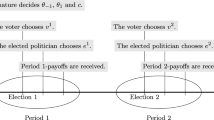Abstract
In a democracy elections are the primary mechanism to discipline politicians. Indeed, policy-makers care for being in office and this affects their policy choices; for instance, they refrain from rent-extraction in order to be re-elected and benefit from future rents. Hence, elections provide implicit incentives that allow voters to align politicians’ preferences with their own ones. This role is crucial because constitutions do not offer explicit incentive schemes (cf. Persson et al., 1997), that is, forms of compensation based on some performance measure as may happen in a relationship between employers and employees.
Early political agency models, such as Barro (1973) and Ferejohn (1986), describe the disciplining effect of elections assuming that voters are backward-looking (i.e., re-election is a reward for incumbent’s past performance) and that the incumbent and the challenger are identical. This implies that even a small change in voters’ preferences makes them leave their announced voting rule.
Access this chapter
Tax calculation will be finalised at checkout
Purchases are for personal use only
Preview
Unable to display preview. Download preview PDF.
Similar content being viewed by others
References
Ashworth, S. (2005). Reputational dynamics and political careers. The Journal of Law, Economics and Organization, 21, 441–466.
Barro, R. J. (1973). The control of politicians: An economic model. Public Choice, 14, 19–42.
Besley, T. (2006). Principled agents? The political economy of good government. Oxford: Oxford University Press.
Borkar, V. S. (2005). Controlled diffusion processes. Probability Surveys, 2, 213–244.
Décamps, J. P., Mariotti, T., & Villeneuve, S. (2005). Investment timing under incomplete information. Mathematics of Operations Research, 30, 472–500.
Ferejohn, J. (1986). Incumbent performance and electoral control. Public Choice, 50, 5–25.
Fleming, W. H., & Rishel, R. (1975). Deterministic and stochastic optimal control. New York: Springer.
Holmström, B. (1982). Managerial incentive problems: A dynamic perspective. In Essays in economics and management in honor of Lars Wahlbeck. Helsinki: Swedish School of Economics. Reprinted in Review of Economic Studies, 66, 169–182 (1999).
Karatzas, I., & Shreve, S. E. (1988). Brownian motion and stochastic calculus. New York: Springer.
Karatzas, I., & Zhao, X. (2001). Bayesian adaptive portfolio optimization. In E. Jouini, J. Cvitanić, & M. Musiela (Eds.), Option pricing, interest rates and risk management (pp. 632–669). Cambridge: Cambridge University Press.
Lakner, P. (1995). Utility maximization with partial information. Stochastic Processes and Their Applications, 56, 247–273.
Liu, J. (2007). Portfolio selection in stochastic environments. The Review of Financial Studies, 20, 1–39.
Persson, T., Roland, G., & Tabellini, G. (1997). Separations of powers and accountability. The Quarterly Journal of Economics, 112, 1163–1202.
Pham, H. (2009). Portfolio optimization under partial observation: Theoretical and numerical aspects. In D. Crisan & B. Rozovsky (Eds.), Handbook of nonlinear filtering. Oxford: Oxford University Press.
Rieder, U., & Bäuerle, N. (2005). Portfolio optimization with unobservable Markov-modulated drift process. Journal of Applied Probability, 42, 362–378.
Rogoff, K. (1990). Equilibrium political budget cycles. American Economic Review, 80, 21–36.
Zariphopoulou, T. (2001). A solution approach to valuation with unhedgeable risks. Finance and Stochastics, 5, 61–82.
Acknowledgements
We are very grateful to an anonymous referee for suggesting several improvements. We also thank the seminar participants at the MDEF 2008. All errors are solely our responsibility. Financial support from the Università Cattolica di Milano is gratefully acknowledged.
Author information
Authors and Affiliations
Corresponding author
Editor information
Editors and Affiliations
Rights and permissions
Copyright information
© 2010 Springer-Verlag Berlin Heidelberg
About this chapter
Cite this chapter
Longo, M., Mainini, A. (2010). Political Accountability: A Stochastic Control Approach. In: Bischi, G., Chiarella, C., Gardini, L. (eds) Nonlinear Dynamics in Economics, Finance and Social Sciences. Springer, Berlin, Heidelberg. https://doi.org/10.1007/978-3-642-04023-8_15
Download citation
DOI: https://doi.org/10.1007/978-3-642-04023-8_15
Published:
Publisher Name: Springer, Berlin, Heidelberg
Print ISBN: 978-3-642-04022-1
Online ISBN: 978-3-642-04023-8
eBook Packages: Business and EconomicsEconomics and Finance (R0)




